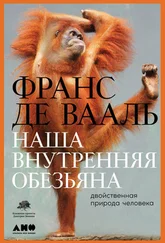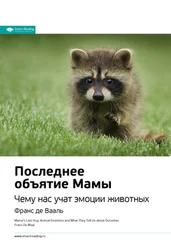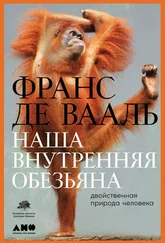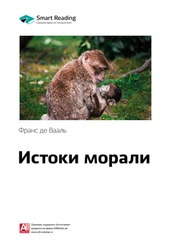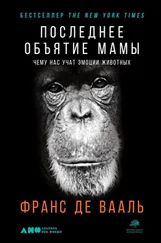Bartal, I. B.-A., J. Decety, and P. Mason. 2011. Empathy and pro-social behavior in rats. Science 334:1427–30.
Barton, R. A., and C. Venditti. 2013. Human frontal lobes are not relatively large. Proceedings of the National Academy of Sciences USA 110: 9001–9006.
Baumeister, R. F. 2008. Free will in scientific psychology. Perspectives on Psychological Science 3:14–19.
Bekoff, M. 1972. The development of social interaction, play, and metacommunication in mammals: An ethological perspective. Quarterly Review of Biology 47:412–34.
Beran, M. J. 2002. Maintenance of self-imposed delay of gratification by four chimpanzees ( Pan troglodytes ) and an orangutan ( Pongo pygmaeus ). Journal of General Psychology 129:49–66.
Berns, G. S., A. Brooks, and M. Spivak. 2013. Replicability and heterogeneity of awake unrestrained canine fMRI responses. PLoS ONE 8: e81698.
Biro, D., T. Humle, K. Koops, C. Sousa, M. Hayashi, and T. Matsuzawa. 2010. Chimpanzee mothers at Bossou, Guinea, carry the mummified remains of their dead infants. Current Biology 20: R351 – R352.
Bloom, P. 2016. Against Empathy: The Case for Rational Compassion . New York: Ecco.
Boesch, C. 1994. Cooperative hunting in wild chimpanzees. Animal Behaviour 48:653–67.
Bosch, O. J., et al. 2009. The CRF System mediates increased passive stresscoping behavior following the loss of a bonded partner in a monogamous rodent. Neuropsychopharmacology 34:1406–15.
Braithwaite, V. 2010. Do Fish Feel Pain? Oxford: Oxford University Press.
Brosnan, S. F., and F. B. M. de Waal. 2003a. Regulation of vocal output by chimpanzees finding food in the presence or absence of an audience. Evolution of Communication 4:211–24.
–. 2003b. Monkeys reject unequal pay. Nature 425:297–99.
–. 2014. The evolution of responses to (un) fairness. Science 346:314–322.
Brotcorne, F., et al. 2017. Intergroup variation in robbing and bartering by longtailed macaques at Uluwatu Temple (Bali, Indonesia). Primates 58:505–16.
Buchanan, T. W., S. L. Bagley, R. B. Stansfield, and S. D. Preston. 2012. The empathic, physiological resonance of stress. Social Neuroscience 7:191–201.
Burkett, J., et al. 2016. Oxytocin-dependent consolation behavior in rodents. Science 351:375–78.
Burrows, A. M., B. M. Waller, L. A. Parr, and C. J. Bonar. 2006. Muscles of facial expression in the chimpanzee ( Pan troglodytes ): Descriptive, comparative and phylogenetic contexts. Journal of Anatomy 208:153–67.
Calcutt, S. E., T. L. Rubin, J. Pokorny, and F. B. M. de Waal. 2017. Discrimination of emotional facial expressions by tufted capuchin monkeys ( Sapajus apella ). Journal of Comparative Psychology 131:40–49.
Call, J. 2004. Inferences about the location of food in the great apes. Journal of Comparative Psychology 118:232–41.
Campbell, M. W., and F. B. M. de Waal. 2011. Ingroup-outgroup bias in contagious yawning by chimpanzees supports link to empathy. PloS ONE 6: e18283.
Caruana, F., et al. 2011. Emotional and social behaviors elicited by electrical stimulation of the insula in the macaque monkey. Current Biology 21:195–99.
Chamberlain, D. B. 1991. Babies don’t feel pain: A century of denial in medicine. Lecture at the 2nd International Symposium on Circumcision, San Francisco, CA.
Chen, P. Z., R. L. Carrasco, and P. K. L. Ng. 2017. Mangrove crab uses victory display to “browbeat” losers from re– initiating a new fight. Ethology 123:981–88.
Chester, D. S., and C. N. DeWall. 2017. Combating the sting of rejection with the pleasure of revenge: A new look at how emotion shapes aggression. Journal of Personality and Social Psychology 112:413–30.
Churchill, W. S. 1924. Shall we commit suicide? Nash’s Pall Mall Magazine .
Churchland, P. S. 2011. Braintrust: What Neuroscience Tells Us about Morality . Princeton, NJ: Princeton University Press.
Clay, Z., and F. B. M. de Waal. 2013. Development of socio-emotional competence in bonobos. Proceedings of the National Academy of Sciences USA 110:18121–26.
Clayton, N. S., and A. Dickinson. 1998. Episodic-like memory during cache recovery by scrub jays. Nature 395:272–74.
Coan, J. A., H. S. Schaefer, and R. J. Davidson. 2006. Lending a hand: Social regulation of the neural response to threat. Psychological Science 17:1032–39.
Coe, C. L., and L. A. Rosenblum. 1984. Male dominance in the bonnet macaque: A malleable relationship. In Social Cohesion: Essays Toward a Sociophysiological Perspective , ed. P. R. Barchas and S. P. Mendoza, 31–63. Westport, CT: Greenwood.
Cordain, L., et al. 2000. Plant-animal subsistence ratios and macronutrient energy estimations in worldwide hunter-gatherer diets. American Journal of Clinical Nutrition 71:682–92.
Crick, F. 1995. The Astonishing Hypothesis: The Scientific Search for the Soul . New York: Scribner.
Curtis, V. A. 2014. Infection-avoidance behaviour in humans and other animals. Trends in Immunology 35:457–64.
Custance, D., and J. Mayer. 2012. Empathic-like responding by domestic dogs ( Canis familiaris ) to distress in humans: An exploratory study. Animal Cognition 15:851–59.
Damasio, A. R. 1994. Descartes’ Error: Emotion, Reason, and the Human Brain . New York: Putnam.
–. 1999. The Feeling of What Happens: Body and Emotion in the Making of Consciousness . New York: Harcourt.
Darwin, C. 1987. The Correspondence of Charles Darwin , vol. 2: 1837–1843. Ed. F. Burkhardt and S. Smith. Cambridge: Cambridge University Press.
–. 1998 [orig. 1872]. The Expression of the Emotions in Man and Animals . New York: Oxford University Press.
Davila Ross, M., S. Menzler, and E. Zimmermann. 2007. Rapid facial mimicry in orangutan play. Biology Letters 4:27–30.
de Montaigne, M. 2003 [orig. 1580]. The Complete Essays . London: Penguin.
de Waal, F. B. M. 1982. Chimpanzee Politics . London: Jonathan Cape.
–. 1986. The brutal elimination of a rival among captive male chimpanzees. Ethology and Sociobiology 7:237–51.
–. 1989. Peacemaking Among Primates . Cambridge, MA: Harvard University Press.
–. 1997a. The chimpanzee’s service economy: Food for grooming. Evolution and Human Behavior 18:375–86.
–. 1997b. Bonobo: The Forgotten Ape . Berkeley: University of California Press.
–. 2007 [orig. 1982]. Chimpanzee Politics: Power and Sex among Apes . Baltimore: Johns Hopkins University Press.
–. 2008. Putting the altruism back into altruism: The evolution of empathy. Annual Review of Psychology 59:279–300.
–. 2011. What is an animal emotion? The Year in Cognitive Neuroscience, Annals of the New York Academy of Sciences 1224:191–206.
–. 2013. The Bonobo and the Atheist: In Search of Humanism Among the Primates . New York: Norton.
–. 2016. Are We Smart Enough to Know How Smart Animals Are? New York: Norton.
de Waal, F. B. M., and L. M. Luttrell. 1985. The formal hierarchy of rhesus monkeys: An investigation of the bared– teeth display. American Journal of Primatology 9:73–85.
–. 1988. Mechanisms of social reciprocity in three primate species: Symmetrical relationship characteristics or cognition? Ethology and Sociobiology 9:101–18.
de Waal, F. B. M., and J. Pokorny. 2008. Faces and behinds: Chimpanzee sex perception. Advanced Science Letters 1:99–103.
Читать дальше
![Франс Вааль Последнее объятие Мамы [litres] обложка книги](/books/406055/frans-vaal-poslednee-obyatie-mamy-litres-cover.webp)
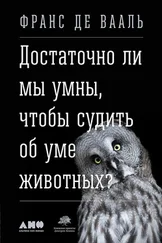
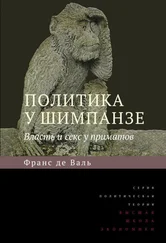
![Дебра Мерк - Девочка в гараже [Реальная история приемной мамы] [litres]](/books/389624/debra-merk-devochka-v-garazhe-realnaya-istoriya-prie-thumb.webp)
![Корен Зайлцкас - Мама, мама [litres]](/books/391290/koren-zajlckas-mama-mama-litres-thumb.webp)
![Елена Бурьевая - 5 секретов не кричащей мамы [litres]](/books/392625/elena-burevaya-5-sekretov-ne-krichachej-mamy-litres-thumb.webp)
![Адриана Имж - #Щастьематеринства [Пособие по выживанию для мамы] [litres]](/books/396962/adriana-imzh-chastematerinstva-posobie-po-vyzhivan-thumb.webp)
